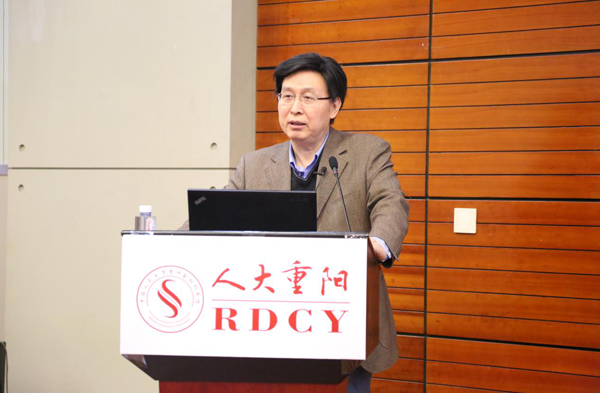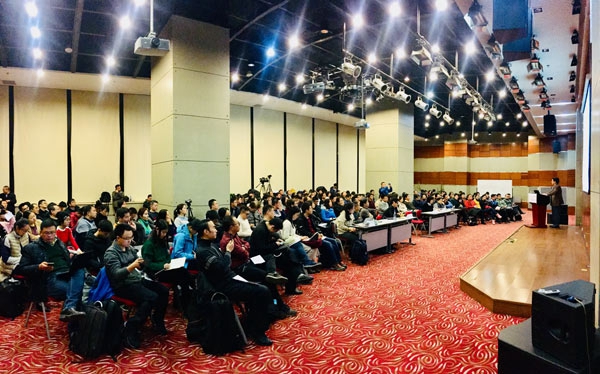Picture
Your Present Location: HOME> PictureYang Guangbin: Rethinking Chinese political reform
This year marks the 40th anniversary of reform and opening up. In order to comb and summarize the valuable experience of Chinese reform and opening up and look forward the developing road for the future, “the 40th anniversary of reform and opening up” series lectures are held at Chongyang Institute for Financial Studies at Renmin University of China (RDCY).
On December 14, Yang Guangbin, Dean of the School of International Studies at Renmin University of China (RUC), was invited to deliver a speech on the 40 years of China’s politics at RDCY.

Dean Yang Guangbin pointed out that when it comes to the relations between politics and economy in China, lots of people think that China’s economic reform is good while the political reform lags behind. Dean Yang cited examples to rethink this opinion. He said that we may need to rethink the so-called political reform lagging behind economic reform from history to reality.
He noted that insisting direction and balancing all aspects are the summaries of the great achievements of 40 years’ reform and opening up.
How to adhere to the direction? After the Third Session of the Eleventh CPC Central Committee, Deng Xiaoping put forward four basic principles and reform. Under the condition of having no idea on how to reform, we held fast the CPC’s leading role, which is a great beginning of reform.
Comparatively speaking, there are many successful revolutions, but there are seldom successful reforms in the world. The reason why we succeeded is that Deng Xiaoping navigated the direction of the reform.
He said that China now is different from many countries that many countries take the “spontaneous order” while China takes the “people-oriented order”
The first step of the “spontaneous order” is to introduce market economy. Without market economy, there will be no competition, no innovation and cannot create more wealth .
Market economy inevitably leads to social differentiation and gap between the rich and the poor. The poor have a party and the rich have another, which is uncontrolled “spontaneous order”. Muti-party politics is representative democracy and the result of representative democracy is oligarchy.

According to investigations, Chinese values are governance-oriented ideology, that is the democracy that Chinese people pay attention to is actually livelihood. The governance-oriented ideology is inclusive.
The first is the central and local relationship, both democratic and central. The centralism shows that the central and local relationship is unitary system, the local power is mandated by the central and local law must abide by the central. Economically, the central and the local share the power.
The second is the relationship between government and market. On the one hand, state leads the economic development. For instance, National Development and Reform Commission plays an important role in promoting the economic development. On the other hand, the enterprise depends on interest groups to have their democratic rights.
The third is the relationship between state and society, both central and democratic. Economic and cultural organizations need to be approved by the central government when established. However, there are more than 1.5 million economic and cultural organizations registered in China.























































































 京公网安备 11010802037854号
京公网安备 11010802037854号





